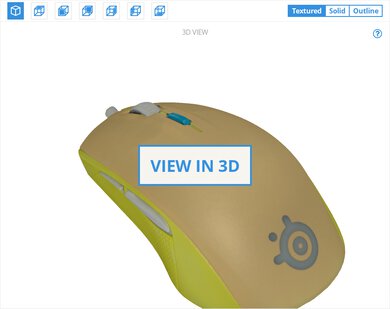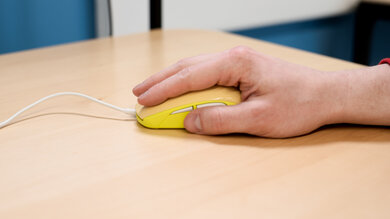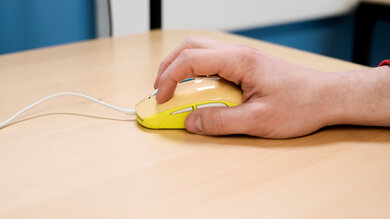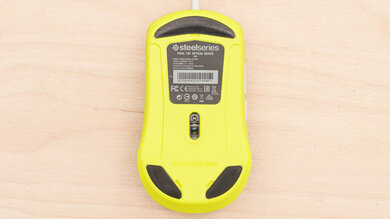The SteelSeries Rival 100 is a very good budget gaming mouse. It feels sturdy and has a symmetrical design, though it only has side buttons on the left. Our unit has a glossy plastic body, but some variants have a rubberized surface. It's ideal for a claw grip for all hand sizes, well-suited for a fingertip grip for all but small hands, and suitable for a palm grip for small and medium-sized hands. It also has good click latency, a good lift-off distance, and a good CPI range, though not quite as good as those on most recent gaming mice. Unfortunately, you can only adjust the CPI by steps of 250, and the cable isn't very flexible.
Our Verdict
The SteelSeries Rival 100 gaming mouse is decent for office use. It feels well-built and has a great number of programmable buttons. It's best suited for a claw or fingertip grip for nearly all hand sizes, but only smaller hands using a palm grip. Unfortunately, it's a wired-only mouse, and the scroll wheel lacks L/R tilt buttons and doesn't unlock for free scrolling.
- Feels well-built.
- All buttons are programmable.
- Wired-only.
- Scroll wheel lacks L/R tilt buttons and doesn't unlock for free scrolling.
The SteelSeries Rival 100 is very good for FPS gaming. It feels sturdy and is ideal for a claw grip for all hand sizes. It's also well-suited for a fingertip grip for all but small hands and suitable for a palm grip for small or medium hands. It has a good click latency, lift-off distance, and CPI range; however, they're not quite as good as most recent gaming mice. Unfortunately, it also has a stiff rubber cable. and you can only adjust the CPI by increments of 250.
- Feels well-built.
- Good click latency.
- All buttons are programmable.
- Borderline heavy.
- Fairly stiff cable.
The SteelSeries Rival 100 is good for MMO gaming, but it doesn't have nearly as many side buttons as dedicated MMO mice and has a fairly stiff cable. That said, it feels well-built, and all buttons are programmable. It's well-suited to almost all hand sizes using a claw or fingertip grip, but it's only suitable for smaller hands using a palm grip. Unfortunately, while it has a good click latency, lift-off distance, and CPI range, they're not as good as most newer gaming mice, and you can only adjust the CPI by steps of 250.
- Feels well-built.
- Good click latency.
- All buttons are programmable.
- Not as many buttons as dedicated MMO mice.
- Fairly stiff cable.
The SteelSeries Rival 100 is good for ultra-light gaming, but it's heavier than dedicated ultra-light mice, and its cable isn't very flexible. That said, it feels sturdy and is ideal for a claw grip regardless of hand size. It's also well-suited for a fingertip grip for all but small hands and suitable for a palm grip for small and medium-sized hands. While it has a good click latency and lift-off distance, they're not quite as good as the majority of more recent gaming mice.
- Feels well-built.
- Good click latency.
- Good mouse feet that glide well on mousepads.
- Borderline heavy.
- Fairly stiff cable.
The SteelSeries Rival 100 gaming mouse is inadequate for travel use. It's rather bulky and may not fit in most laptop cases. It's also a wired mouse, which can make it cumbersome in tight spaces like trains or planes. That said, it feels well-built and is fully compatible with Windows and macOS.
- Feels well-built.
- Wired-only.
- May not fit into most laptop cases.
Check Price
Differences Between Sizes And Variants
The SteelSeries Rival 100 gaming mouse is a predecessor to the SteelSeries Rival 110. The unit we tested is the Gaia Green, but it's also available in Black, White, Forged Red, Proton Yellow, Sakura Purple, and Alchemy Gold. You can see the label for our unit here.
Popular Mouse Comparisons
The SteelSeries Rival 100 is a budget gaming mouse based on the original SteelSeries Rival. It's marketed towards everyday gamers rather than esports professionals and offers one of SteelSeries' most popular shapes at a more accessible price point. It's replaced by the SteelSeries Rival 310, which adopts a more ergonomic, right-handed shape, an updated sensor, and new coatings for the plastic body.
For more options, check out our recommendations for the best mouse, the best wired mouse, and the best gaming mouse.
The SteelSeries Rival 100 is a predecessor of the SteelSeries Rival 310. The Rival 100 has an ambidextrous shape, while the Rival 310 has an ergonomic right-handed shape. Performance-wise, the Rival 310 also has a much wider CPI range, a CPI that's more precisely adjustable, and a better click latency. It also has onboard memory. The Rival 310 is more suitable for a palm or claw grip for most hand sizes, whereas the Rival 100 is best suited for a claw or a fingertip grip for almost all hand sizes.
The Razer Viper Mini is a significantly better wired gaming mouse than the SteelSeries Rival 100. It feels sturdier, has a more flexible cable, better mouse feet, and it's much lighter. It also has a wider CPI range, a more precisely adjustable CPI, and better click latency. Unfortunately, its software is only compatible with Windows, while the SteelSeries has companion software that's compatible with Windows and macOS. The Razer is ideal for a fingertip grip for all hand sizes, while the SteelSeries is best-suited for claw or fingertip grip for most hand sizes. Both mice are suitable for palm grip for smaller hands.
The GLORIOUS Model D is a significantly better wired gaming mouse than the SteelSeries Rival 100. It has a right-handed design and is much lighter, has a much more flexible cable, better mouse feet, a higher maximum CPI, a more precisely adjustable CPI, and lower click latency. Unfortunately, its software is only compatible with Windows. Comparatively, the SteelSeries feels sturdier, but its software is compatible with Windows and macOS. The GLORIOUS is almost universally well-suited to all grip styles and hand sizes, while the SteelSeries is best-suited for a claw or palm grip for most hand sizes.
The SteelSeries Rival 100 is a much earlier predecessor of the SteelSeries Rival 3, and they share nearly identical shapes. Both mice are ideal for a claw grip for all hand sizes. They're also well-suited for a fingertip grip for all but small hands and suitable for a palm grip for small and medium-sized hands. However, the newer Rival 3 feels better-build, and it has a lighter weight, better mouse feet, a lower click latency, a wider CPI range, and a CPI that's more precisely adjustable.
Test Results

If you're interested in a SteelSeries mouse with the same ambidextrous shape but with side buttons on both the left and right sides, check out the SteelSeries Sensei RAW.
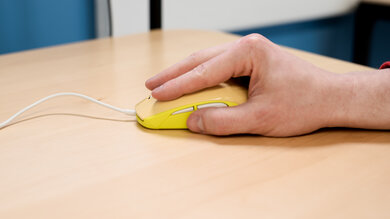
The polling rate settings on the SteelSeries Rival 100 gaming mouse are 125Hz, 250Hz, 500Hz, and 1000Hz.
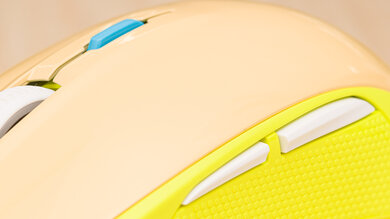
For a similar mouse that has both a CPI up and CPI down button behind the scroll wheel, instead of a single button for cycling CPI profiles, check out the ASUS TUF Gaming M3.

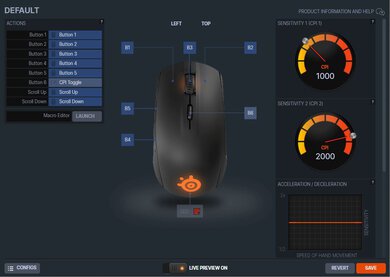
Note: The SteelSeries GG software is only available for Windows. However, the older SteelSeries Engine 3 software is compatible with macOS and provides the same functionality.


